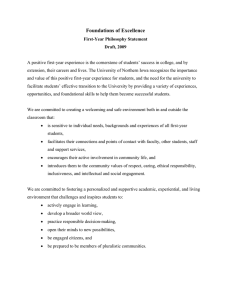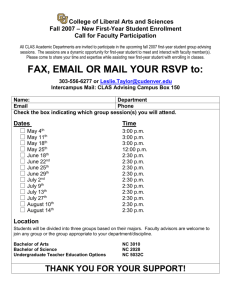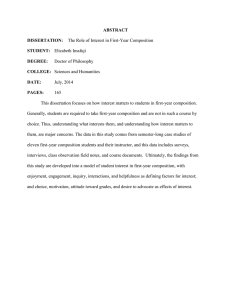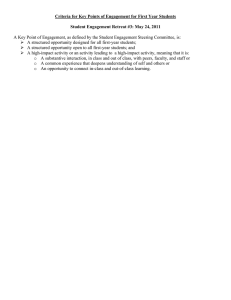Freshman Engineering Program - Embry
advertisement
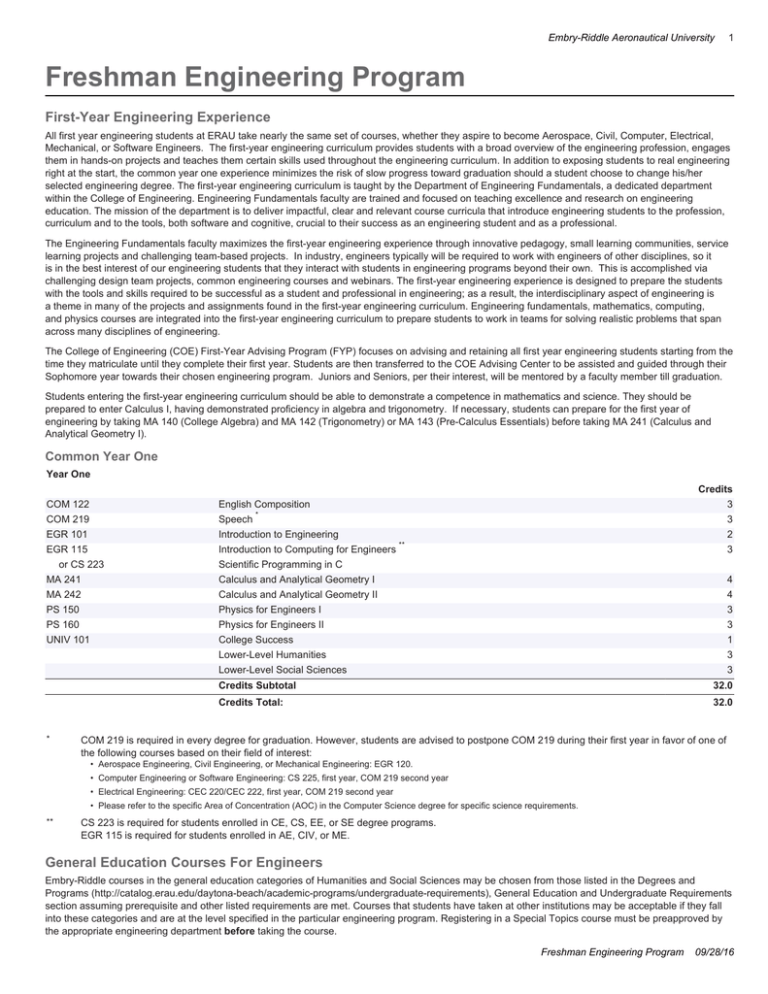
Embry-Riddle Aeronautical University 1 Freshman Engineering Program First-Year Engineering Experience All first year engineering students at ERAU take nearly the same set of courses, whether they aspire to become Aerospace, Civil, Computer, Electrical, Mechanical, or Software Engineers. The first-year engineering curriculum provides students with a broad overview of the engineering profession, engages them in hands-on projects and teaches them certain skills used throughout the engineering curriculum. In addition to exposing students to real engineering right at the start, the common year one experience minimizes the risk of slow progress toward graduation should a student choose to change his/her selected engineering degree. The first-year engineering curriculum is taught by the Department of Engineering Fundamentals, a dedicated department within the College of Engineering. Engineering Fundamentals faculty are trained and focused on teaching excellence and research on engineering education. The mission of the department is to deliver impactful, clear and relevant course curricula that introduce engineering students to the profession, curriculum and to the tools, both software and cognitive, crucial to their success as an engineering student and as a professional. The Engineering Fundamentals faculty maximizes the first-year engineering experience through innovative pedagogy, small learning communities, service learning projects and challenging team-based projects. In industry, engineers typically will be required to work with engineers of other disciplines, so it is in the best interest of our engineering students that they interact with students in engineering programs beyond their own. This is accomplished via challenging design team projects, common engineering courses and webinars. The first-year engineering experience is designed to prepare the students with the tools and skills required to be successful as a student and professional in engineering; as a result, the interdisciplinary aspect of engineering is a theme in many of the projects and assignments found in the first-year engineering curriculum. Engineering fundamentals, mathematics, computing, and physics courses are integrated into the first-year engineering curriculum to prepare students to work in teams for solving realistic problems that span across many disciplines of engineering. The College of Engineering (COE) First-Year Advising Program (FYP) focuses on advising and retaining all first year engineering students starting from the time they matriculate until they complete their first year. Students are then transferred to the COE Advising Center to be assisted and guided through their Sophomore year towards their chosen engineering program. Juniors and Seniors, per their interest, will be mentored by a faculty member till graduation. Students entering the first-year engineering curriculum should be able to demonstrate a competence in mathematics and science. They should be prepared to enter Calculus I, having demonstrated proficiency in algebra and trigonometry. If necessary, students can prepare for the first year of engineering by taking MA 140 (College Algebra) and MA 142 (Trigonometry) or MA 143 (Pre-Calculus Essentials) before taking MA 241 (Calculus and Analytical Geometry I). Common Year One Year One COM 122 COM 219 EGR 101 EGR 115 or CS 223 MA 241 MA 242 PS 150 PS 160 UNIV 101 * Credits 3 3 2 3 English Composition * Speech Introduction to Engineering ** Introduction to Computing for Engineers Scientific Programming in C Calculus and Analytical Geometry I Calculus and Analytical Geometry II Physics for Engineers I Physics for Engineers II College Success Lower-Level Humanities Lower-Level Social Sciences 4 4 3 3 1 3 3 Credits Subtotal 32.0 Credits Total: 32.0 COM 219 is required in every degree for graduation. However, students are advised to postpone COM 219 during their first year in favor of one of the following courses based on their field of interest: • Aerospace Engineering, Civil Engineering, or Mechanical Engineering: EGR 120. • Computer Engineering or Software Engineering: CS 225, first year, COM 219 second year • Electrical Engineering: CEC 220/CEC 222, first year, COM 219 second year • Please refer to the specific Area of Concentration (AOC) in the Computer Science degree for specific science requirements. ** CS 223 is required for students enrolled in CE, CS, EE, or SE degree programs. EGR 115 is required for students enrolled in AE, CIV, or ME. General Education Courses For Engineers Embry-Riddle courses in the general education categories of Humanities and Social Sciences may be chosen from those listed in the Degrees and Programs (http://catalog.erau.edu/daytona-beach/academic-programs/undergraduate-requirements), General Education and Undergraduate Requirements section assuming prerequisite and other listed requirements are met. Courses that students have taken at other institutions may be acceptable if they fall into these categories and are at the level specified in the particular engineering program. Registering in a Special Topics course must be preapproved by the appropriate engineering department before taking the course. Freshman Engineering Program 09/28/16 2 Embry-Riddle Aeronautical University Still Exploring Engineering Freshman Engineering students that are still exploring which degree program to select may enroll in the engineering Common Year One courses as advised by FYP. This enables an engineering student interested in engineering to explore the content of all the engineering programs during their first year. All courses in the above list apply towards any engineering degree. Sophomores will then be assigned to the COE Advising Center for advisement of courses towards a particular engineering program. During the sophomore year, Still Exploring Engineering students need to select a degree program. Pre-college preparation in math and physics is essential for the success in engineering. If it is necessary to enroll in more basic math and physics courses to ensure that preparation, still exploring engineering students should understand it may take them longer to complete their chosen degree. Freshman Engineering Program 09/28/16
